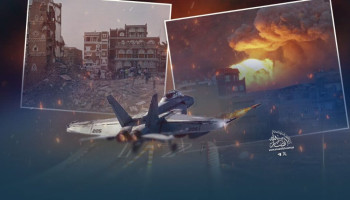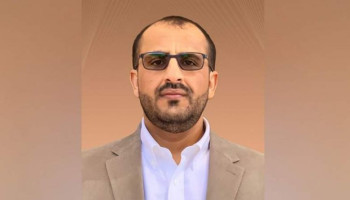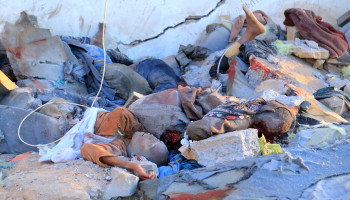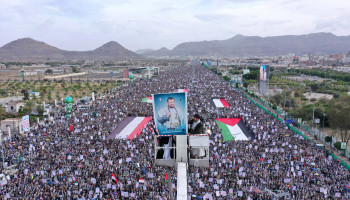Who's responsible for the Safer ship crisis?
الثلاثاء, 09 يونيو 2020

Since the beginning we are calling for the maintenance of the Safer tanker, but the forces of aggression supported by the United States deliberately by its unjust blockade put obstacles and prevent editing, and therefore they bear all the repercussions of any leakage, and Washington also bears the responsibility for providing political cover and military support for the continuation of the aggression and the blockade. Muhammad al-Salam.
The crimes of the forces of the Coalition of Aggression in Yemen did not stop killing and detaining fishermen, cutting off their livelihoods and confiscating their boats, killing fish and marine life, stealing marine life unique to Yemeni coasts, islands and waters, and using them as a dump for burying chemical waste, dredging and stealing reefs. Coral, anarchist fishing threatened by the imbalance of marine life and the maritime system, and even more than that to the most heinous in the history of the crimes of the occupying forces and tyranny throughout human history, through criminal planning since the first day of their sinful aggression against Yemen, to the situation of Yemen and the region From the Strait of Hormuz to the Suez Canal on the crater of a volcano, it can take more than 150 years to recover.
The volcano is the floating/inhabited Safer ship reservoir at Ras Issa port, and, more correctly, the huge bomb floating in the Red Sea, as described by The Atlantic Council in April 2019.
With the beginning of the aggression of the Coalition of the Storm on Yemen 26 March 2015, the eyes of the aggressor states turned to the coasts, islands and ports of Yemen before the Yemeni interior, because of their geopolitical and economic importance, and to facilitate this task, they worked to strike a suffocating naval blockade in the hope of killing the Yemeni people with hunger, and creating time bombs, to declare them in the face of this patient and steadfast people when the forces of aggression find themselves in a military or political impasse.
One of the most filthy and dangerous weapons of aggression forces prevents technical teams from carrying out maintenance work in the floating Safer tanks off the waters of Ras Isa port in the Red Sea, after the suspension of work on the ship due to the targeting of the aircraft aggression facility Ras Issa, preventing its operation and preventing its emptying of its oil reserves for the fifth year in a row, with increasing domestic and international warnings of corrosion and rust of reservoirs, and growing fears of oil leakage and explosion at any moment, threatening marine pollution that may extend to more than 939 1 trillion square meters, thus putting the entire region, not just Yemen, in the face of a regional environment disaster nearly four times the size of the Exxon Valdez oil spill in the United States of America (Alaska, 1989).
The explosion of dilapidated Safer tanks and the leakage of its oil reserves into the sea water simply means that the region is directly confronted with the largest and most tragic environmental disaster in human history, according to the Warning of the American Study Center "The Atlantic Council", its destructive effects on marine life in Yemeni territorial waters for more than 150 years, and its explosion threatens according to local reports more than 150 thousand fishermen in Yemen alone, and threatens the lives of more than 1.3 5 million families whose livelihood depends on fishing as a single source of income. The impact on five countries in the region, according to the deputy general manager of the Yemeni oil company in Hodeidah, "Hani Alwan".
These concerns come as Safer company and the Ministries of Oil and Foreign Affairs in Sana'a, the Government of the Rescue of the United Nations and the international community, to intervene with the forces of aggression and the government of hotels loyal to the hastening to rescue the floating ship Safer, with increasing cracks and corrosion in its tanks, and Sana'a has put forward several initiatives to remedy the situation and find a satisfactory way for all parties, to no avail.
While the United Nations has merely made secret promises, without exerting any pressure on the forces of aggression and their supporters, who, as usual, disclaim responsibility for the disaster created by their sinful aggression, reinforced by the protection of their patrons in the Black House, insisting as always to hold the victim responsible for the rolling disaster and to exonerate the forces of aggression.
In November 2016, the Oil Company in Sana'a accused the forces of aggression by preventing technical teams from reaching the ship or carrying out any maintenance of the ship, and from that day began the crisis of the ship Safer inhabited put itself strongly on the global human conscience, without finding it listening to it in this deaf world, as is the case of the inhuman crimes that are carried out from the mercy of the aggression of the storm alliance in its forgotten war against Yemen and Yemenis.
Concerns have recently increased after a hole in a pipe and seawater leak into the engine room, which threatens to sink, leak or blow up Safer-blowing vessel at any moment, which means that the ship's position has entered the dangerous phase, which calls for accelerated assessment, maintenance and discharge of oil stocks before one of the largest environmental and economic disasters in the region and the world.
* Safer ship in lines
The floating oil vessel / vessel / tanker / tanks of Safer are located in Ras Issa port, named after the location where the oil was first discovered in Yemen, a floating vacuum tank permanently fixed among the Yemeni waters opposite Ras Issa port, is the third largest floating oil terminal in the world, and contains about 34 crude oil storage tanks, with different sizes and capacities, with a capacity of 3 million barrels of oil. Manufactured in Japan in 1976, owned by The Safer Production and Exploration Company of Yemen, the company sent it in 1988 to the port of Ras Issa in the north of Hodeidah province, located 8 km / 4.8 nautical miles from the Yemeni coast on the Red Sea, and weighs about 410 thousand metric tons, and is connected by an oil pipeline with the fields of Safer in Marib province, about 428 kilometers long.
The Safer is the main export and unloading station for light crude oil extracted from Sector 18 in Safar area of Marib province and Sector 9 in Malik area of Shabwa governorate.
After the aggression of the Storm Alliance March 26, 2015, its oil reserves, estimated at 1.278 thousand barrels of crude oil, were not exported, valued at about $60 million according to oil prices in July 2019, and employees were withdrawn and regular maintenance work was completed. The Yemeni treasury costs about $10 million annually, and the coalition prevents the arrival of maintenance teams, prevents the supply of the necessary gasoline to operate it, and prevents the discharge of oil in it, despite local and international appeals, especially with the end of its life 10 years ago / 2011 Its internal boilers have stopped producing inert gas in tank tanks, and its importance lies in preventing any explosion or chemical reaction leading to an explosion, as a result of the gases emitted from the oil stored in the ship. Due to the lack of gasoline needed to operate these boilers, which threatens to cause an oil spill or the accumulation of highly flammable gases, and therefore the explosion of the ship, as a result of the formation of hydrocarbon gases emitted from crude oil in those reservoirs, and an environmental and economic disaster that could cause Yemen to lose millions of dollars.
The British Observatory for Conflict and Environment (CEOBS) asserts that the lack of gasoline simply means that the Safer tank engines have not been operational for several years, causing the structure to be exposed to moisture and corrosion with poor maintenance, with a single structure, which may be at risk.
* Appeals and initiatives
The appeals of the officials of the Rescue Government in Sana'a and Safir company to the international community to save the safar ship for the fifth year in a row, and warn editing the consequences, have not stopped with an unwelcome disaster, but all those warnings have not been heeded to the moment, the latest of which appealed to the Ministry of Oil and Minerals in Sana'a in a statement on May 9, 2020 the United Nations represented in its office in Yemen, and all international organizations to carry out their responsible and humanitarian role in protecting the ship from any targeting by the states of aggression, the latest of which appealed to the Ministry of Oil and Minerals in Sana'a in a statement on May 9, 2020, the United Nations represented by its office in Yemen, and all international organizations to carry out their responsible and humanitarian role in protecting the ship from any targeting by the states of aggression, and pressure to allow the sale of crude oil in Yemen, and all international organizations to carry out their responsible and humanitarian role in protecting the ship from any targeting by the states of aggression, and to press the Ministry of Oil and Minerals in Sana'a on May 9, 2020, the United Nations represented by its office in Yemen, and all international organizations to carry out their responsible and humanitarian role in protecting the ship from any targeting by the states of aggression, and pressing for the sale of crude oil in it, taking advantage of the return in the construction of alternative oil reservoirs, as they have become dilapidated and maintenance work is stalled, and blamed the United Nations and the coalition for "full responsibility for an environmental disaster in the Red Sea reaching the Suez Canal, and the destruction of marine life, as a result of any oil spill."
The Minister of Oil and Minerals of the Rescue Government warned during his meeting with the Humanitarian Coordinator in Yemen "Lise Grande" 13 December 2019 that the failure to maintain the "Safer" reservoir became a time bomb threatening the marine environment in the region, and promised the UN coordinator on more than one occasion to intervene and carry out urgent maintenance to no avail, and to the moment the United Nations did not exert any pressure on the forces of aggression and the government of hotels in order to allow the maintenance of the ship.
The U.S. State Department, in turn, was quick to hold the rescue government responsible for the disaster caused by the explosion of the ship or the oil spill, by virtue of its fall within its fire control, which Sana'a strongly denied its willingness to repair the ship and send technical teams assigned to it maintenance work in the eyes of the United Nations, but the forces of aggression by virtue of its suffocating blockade on the coast of Yemen by air and sea prevent the arrival of technical teams to the ship until the moment.
In its resolution 2511, on February 25, 2020, the UN Security Council merely stressed for the first time since the beginning of the Safer crisis the environmental risks and the need to allow undelayed access of United Nations personnel to inspect and maintain the ship, a single, orphan and ineffective signal on the ground, making the United Nations and the Security Council primarily responsible for the consequences of the explosion or leakage of Safer ship alongside the United States.
Initiatives:
Sana'a has launched several initiatives to avoid the danger to all without exception, the most prominent of which are:
The initiative of the martyr president "Saleh al-Samad" in early 2017, which includes giving the United Nations a role to work to allow the export of oil stocks on the ship and sell it in exchange for medicines for the Yemeni people.
On November 4, 2018, the Minister for Foreign Affairs of the Rescue Government, the UN Secretary-General, called for pressure to allow the use of the ship's oil to generate electricity for Yemeni cities, in order to alleviate the humanitarian situation and avoid the environmental disaster caused by any oil spill.
On May 1, 2019, a member of the Supreme Political Council, Muhammad Ali al-Houthi, called on the United Nations and the International Security Council to establish a mechanism based on the sale of Yemeni crude oil, including Safer oil, in exchange for the provision and import of oil, diesel and domestic gas, and to return what is sold to the Banks of Sana'a and Aden, and allocate this to pay the salaries of employees under their control.
All of them have been rejected by the states of aggression and the hotel government, not interested in the disastrous consequences of this refusal.
* Effects and implications
Many local and international reports have reported on a long list of the effects and risks of a Safer ship exploding, sinking or oil leak, God forbid, including, in short but not limited to:
The loss and destruction of the North Kamran Island Reserve due to its proximity to the ship, which is a rich island of mangroves, coral reefs, many species of fish and shark, an important diving tourist façade and an excellent fishing center.
Coral reefs lose their natural habitat, coral mortality, and the majority of organisms in their ecosystem are not regenerated.
Coral reefs are the breeding grounds for fish, and small marine plankton is the main food for large fish.
Fatal damage to plant breezes and algae, which are primarily responsible for stabilizing energy in the marine environment.
Catastrophic repercussions on sharks, molluscs and other marine life, drinking and desalination water, birds and fish farms, navigation services, the beauty of beaches, boat moorings, ports, corniches, coasts and salt production.
Damage to the bottom, due to the deep-sea deposit of heavy oil parts, has a long-term effect, and the process of processing it is difficult, complex and costly.
Leave serious damage to the health of the population in nearby areas, where field studies predict the evaporation of two thirds of the amount leaked and spilled from the reservoir in seawater within days when the leakage occurs, in addition to the associated gases that will result from them, which will spread in the air, and inhaled by the population, causing a lot of trouble and diseases in the respiratory system.
Source: Saba






